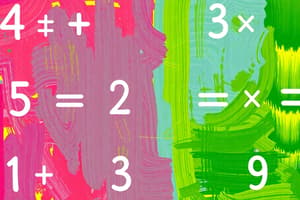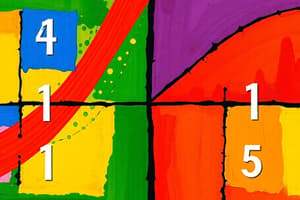Podcast
Questions and Answers
How is the identity property of addition defined?
How is the identity property of addition defined?
- a + 1 = a + a
- a + a = 2a
- a + 0 = 0
- a + 0 = a (correct)
Which statement about subtraction is true?
Which statement about subtraction is true?
- Subtracting a negative number increases the value.
- Subtraction can be expressed as addition of a negative. (correct)
- Subtraction is always defined.
- Subtraction is commutative.
Which property does NOT apply to multiplication?
Which property does NOT apply to multiplication?
- Associative property
- Identity property
- Distributive property
- Inverse property (correct)
What is the result of the division $25 ÷ 5$?
What is the result of the division $25 ÷ 5$?
According to the order of operations, which operation should you perform first in the expression $3 + 2 × (5 - 1)$?
According to the order of operations, which operation should you perform first in the expression $3 + 2 × (5 - 1)$?
Flashcards are hidden until you start studying
Study Notes
Basic Arithmetic
Addition
- Definition: Combining two or more numbers to get a total.
- Symbols: +
- Properties:
- Commutative: a + b = b + a
- Associative: (a + b) + c = a + (b + c)
- Identity: a + 0 = a
Subtraction
- Definition: Removing one number from another.
- Symbols: -
- Properties:
- Not commutative: a - b ≠ b - a
- Inverse of addition: a - b = a + (-b)
- Identity: a - 0 = a
Multiplication
- Definition: Repeated addition of a number.
- Symbols: × or *
- Properties:
- Commutative: a × b = b × a
- Associative: (a × b) × c = a × (b × c)
- Distributive: a × (b + c) = a × b + a × c
- Identity: a × 1 = a
Division
- Definition: Splitting a number into equal parts.
- Symbols: ÷ or /
- Properties:
- Not commutative: a ÷ b ≠ b ÷ a
- Inverse of multiplication: a ÷ b = a × (1/b)
- Identity: a ÷ 1 = a
- Division by zero is undefined.
Order of Operations
- Rules for determining the sequence of calculations:
- Parentheses: Solve expressions in parentheses first.
- Exponents: Evaluate powers and roots next.
- Multiplication and Division: Perform these operations from left to right.
- Addition and Subtraction: Finally, perform these operations from left to right.
- Mnemonic: PEMDAS (Parentheses, Exponents, Multiplication and Division, Addition and Subtraction).
Basic Arithmetic
Addition
- Definition: Combining two or more numbers to obtain a total.
- Symbol: +
- Commutative Property: Order of addends does not affect sum (e.g., a + b = b + a).
- Associative Property: Grouping of numbers does not change their sum (e.g., (a + b) + c = a + (b + c)).
- Identity Property: Adding zero to a number does not change its value (e.g., a + 0 = a).
Subtraction
- Definition: Removing one number from another.
- Symbol: -
- Non-Commutative: Order matters in subtraction (e.g., a - b ≠ b - a).
- Inverse of Addition: Can be expressed using addition of a negative number (e.g., a - b = a + (-b)).
- Identity Property: Subtracting zero from a number leaves it unchanged (e.g., a - 0 = a).
Multiplication
- Definition: Repeated addition of a number.
- Symbols: × or *
- Commutative Property: Order of factors does not affect the product (e.g., a × b = b × a).
- Associative Property: Grouping of numbers does not alter their product (e.g., (a × b) × c = a × (b × c)).
- Distributive Property: Multiplication distributes over addition (e.g., a × (b + c) = a × b + a × c).
- Identity Property: Multiplying a number by one leaves it unchanged (e.g., a × 1 = a).
Division
- Definition: Splitting a number into equal parts.
- Symbols: ÷ or /
- Non-Commutative: Order matters in division (e.g., a ÷ b ≠ b ÷ a).
- Inverse of Multiplication: Division can be expressed as multiplication by the reciprocal (e.g., a ÷ b = a × (1/b)).
- Identity Property: Dividing a number by one does not change its value (e.g., a ÷ 1 = a).
- Undefined: Division by zero does not produce a valid result.
Order of Operations
- Sequence to determine the order of calculations:
- Parentheses: Solve expressions within parentheses first.
- Exponents: Evaluate powers and roots next.
- Multiplication and Division: Perform from left to right.
- Addition and Subtraction: Finally, perform from left to right.
- Mnemonic: Use PEMDAS to remember the order (Parentheses, Exponents, Multiplication and Division, Addition and Subtraction).
Studying That Suits You
Use AI to generate personalized quizzes and flashcards to suit your learning preferences.




